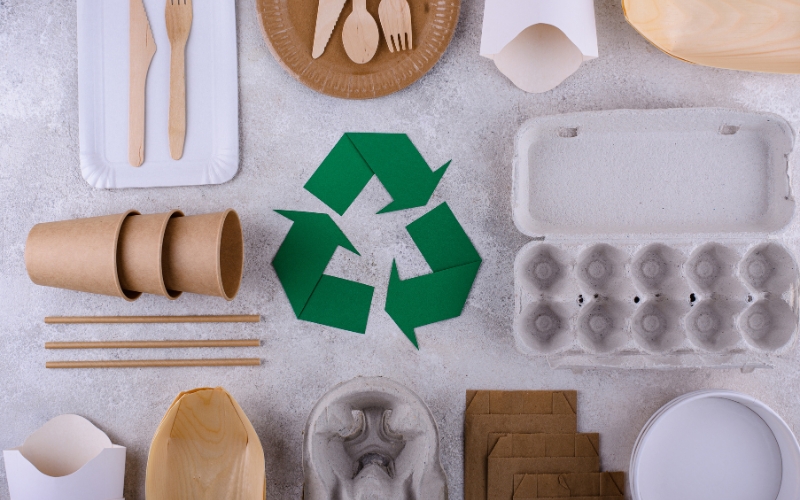In the quest for a more sustainable future, finding eco-friendly alternatives to everyday plastics is essential. Plastics, particularly single-use items, contribute significantly to environmental pollution and resource depletion. Fortunately, a variety of innovative and sustainable products are available that help reduce our reliance on plastics while offering functional and stylish alternatives. Here’s a look at some of the best eco-friendly alternatives to common plastic items.
1. Reusable Water Bottles
Material Alternatives
- Stainless Steel: Durable and free from harmful chemicals, stainless steel water bottles are a popular choice for hydration. They keep beverages hot or cold for extended periods and are easy to clean.
- Glass: Glass bottles are a safe and non-reactive alternative to plastic. They are recyclable and can be used with silicone sleeves for added protection.
- Bamboo: Bamboo water bottles offer a natural, renewable alternative. They are lightweight and often come with a stainless steel or glass inner lining.
2. Reusable Shopping Bags
Material Alternatives
- Cotton: Cotton shopping bags are washable, durable, and can be reused many times. Organic cotton options are available for a more eco-friendly choice.
- Jute: Jute bags are made from natural fibers and are strong and biodegradable. They are an excellent option for carrying groceries and other items.
- Recycled Plastics: Some reusable bags are made from recycled plastic bottles, helping to repurpose waste and reduce environmental impact.
3. Compostable Kitchenware
Material Alternatives
- Bamboo: Bamboo utensils and cutting boards are biodegradable, durable, and require less energy to produce compared to plastic alternatives.
- Biodegradable Plates and Cutlery: Made from materials like cornstarch, sugarcane, or palm leaves, these products decompose naturally and are suitable for single-use situations.
- Silicone: Silicone kitchenware is flexible, durable, and can be reused many times. It is heat-resistant and free from harmful chemicals.
4. Eco-Friendly Food Storage
Material Alternatives
- Beeswax Wraps: Beeswax wraps are a reusable alternative to plastic wrap. They are made from organic cotton coated with beeswax, resin, and jojoba oil, and can be washed and reused.
- Glass Containers: Glass food storage containers are free from chemicals and are durable. They come with airtight lids and are suitable for both storage and microwaving.
- Silicone Bags: Silicone food storage bags are reusable, durable, and free from BPA. They are suitable for freezing, heating, and carrying snacks.
5. Sustainable Personal Care Products
Material Alternatives
- Bamboo Toothbrushes: Bamboo toothbrushes are biodegradable and offer a sustainable alternative to plastic toothbrushes. They are available with various bristle options, including plant-based or recyclable materials.
- Refillable Beauty Products: Many beauty brands offer refillable containers for products such as lotions, shampoos, and soaps, reducing packaging waste.
- Solid Shampoo Bars: Solid shampoo bars are free from plastic packaging and are often made with natural ingredients. They last longer than liquid shampoos and are travel-friendly.
6. Eco-Friendly Cleaning Supplies
Material Alternatives
- Reusable Cleaning Cloths: Instead of disposable paper towels, opt for washable and reusable cloths made from materials like microfiber or organic cotton.
- Natural Cleaning Products: Use cleaning products made from natural, non-toxic ingredients. Brands that use eco-friendly packaging and offer refill options can reduce plastic waste.
- Biodegradable Sponges: Sponges made from natural materials like cellulose or coconut fibers are biodegradable and offer an alternative to synthetic sponges.
7. Sustainable Packaging Solutions
Material Alternatives
- Paper and Cardboard: Paper and cardboard are biodegradable and recyclable alternatives to plastic packaging. They can be used for a variety of packaging needs, from food containers to shipping materials.
- Mushroom Packaging: Made from mycelium (the root system of fungi), mushroom packaging is biodegradable and compostable. It offers an eco-friendly alternative for cushioning and packing materials.
- Cornstarch Packaging: Cornstarch-based packaging is compostable and can be used for a variety of applications, including food containers and packing peanuts.
8. Eco-Friendly Travel Products
Material Alternatives
- Travel Utensil Sets: Portable utensil sets made from bamboo, stainless steel, or silicone reduce the need for disposable plastic cutlery.
- Eco-Friendly Toiletry Kits: Refillable toiletry containers and solid toiletries (shampoo bars, conditioner bars) help minimize the use of single-use plastics during travel.
9. Sustainable Fashion
Material Alternatives
- Organic Cotton and Hemp: Clothing made from organic cotton or hemp is produced without harmful pesticides and chemicals, offering a more sustainable alternative to conventional fabrics.
- Recycled Fabrics: Fabrics made from recycled plastics or other materials help reduce waste and conserve resources. Look for products made from recycled polyester or nylon.
- Second-Hand and Vintage: Purchasing second-hand or vintage clothing reduces the demand for new production and helps extend the lifecycle of garments.
Conclusion
Switching to eco-friendly alternatives for everyday plastics can significantly reduce our environmental impact and promote sustainability. By opting for reusable, biodegradable, and recycled materials, we can make more responsible choices and contribute to a healthier planet. Embracing these sustainable products not only helps reduce plastic waste but also encourages innovation and supports a circular economy. As consumers, we have the power to drive change and make a positive impact through the choices we make in our daily lives.


